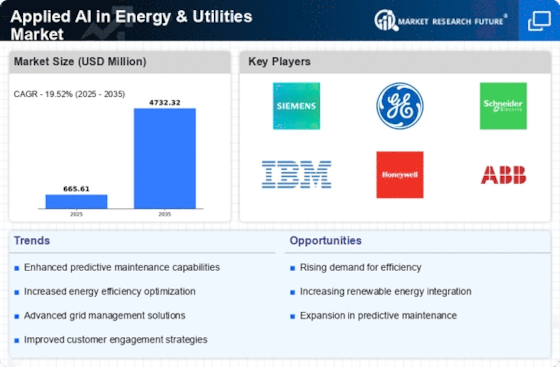Market Share
Applied AI in Energy & Utilities Market Share Analysis
The market for Applied Artificial Intelligence (AI) in Energy & Utilities has witnessed a significant shift from traditional energy sector towards the integration of artificial intelligence technologies. In recent years, one of the trends in this market is that companies have been using AI for predictive maintenance and asset management in the energy industry. For utilities, data from sensors and IoT devices are analyzed by AI algorithms to predict equipment failures, optimize maintenance schedules and improve overall reliability of energy infrastructure.This is consistent with the industry’s desire to minimize downtime, increase lifecycles and enhance power generation efficiencies at large.
Also, there has been an increasing focus on grid optimization as well as energy management through ai driven solutions in applied ai in energy & utilities market. Currently smart grids together with energy management systems use AI algorithms in order to analyze real-time information on consumption patterns, demand levels as well as grid statuses .This trend is remarkable when it comes to optimizing distribution of power among different groups; minimizing losses when it comes to provision of electricity; making transmission networks more resilient and sustainable.
Further, integration of AI into renewable energy systems like solar and wind power is a notable trend. AI algorithms are involved in energy forecasting, optimizing the performance of renewable energy assets, and improving the overall efficiency of clean energy production. This direction is very important in solving the issue of variability and intermittency associated with renewable sources of power and this guarantees that steady and quality power will always be available from such sustainable sources.
The Applied AI in Energy & Utilities market has also made strides towards AI optimization for energy storage solutions. Data on demand side response, pricing, or grid conditions are analyzed by AI algorithms to optimize charging and discharging operations in energy storage systems. The use of such technologies helps stabilize the grid through facilitating backup power supply as well as efficient utilization of renewable energy resources using energy storage devices like batteries.
In response to increasing complexity of energy trading and market dynamics it has been observed that there is an inclination toward AI-powered platforms for trading energies. Machine learning algorithms on these platforms spot trends in markets, forecast prices for electricity among other things prior to smart trade execution. This emphasis is fundamental because it allows companies to make informed decisions about what they are doing when they are operating within volatile sectors as far as their portfolios are concerned so that risks can be mitigated.


















Leave a Comment